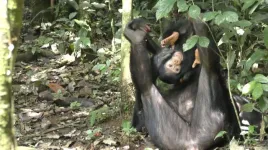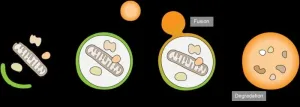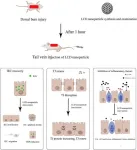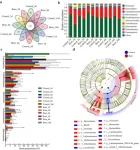(Press-News.org) Contrary to common belief, not all vertebrates regulate their sleep-wake rhythm in the same way. University of Basel researchers have discovered that some fish – unlike humans – do not need orexin to stay awake. This molecule was thought to be necessary for normal wake and sleep rhythms in vertebrates. Humans without orexin suffer from narcolepsy.
Until recently, it was assumed that vertebrates share similar mechanisms controlling sleep behavior. That's why researchers have been using fish in the past 20 years as a model organism to study sleep and its regulation.
Now the team led by Professor Alex Schier at the Biozentrum, University of Basel, has made a surprising discovery in a South Asian fish species: Clown loaches, which can also be found in zoos and aquariums, exhibit normal sleep rhythms, but their sleep is regulated in a different way. They lack the so-called orexin signaling pathway (also known as Hypocretin signaling pathway), previously considered to be essential for controlling sleep and wake in all vertebrates. The results of the study have now been published in Current Biology.
Sleep-wake rhythm without orexin
“We were very surprised that clown loaches show normal sleep rhythms and, above all, they can easily be awakened despite a defective orexin pathway,” says first author Dr. Vassilis Bitsikas. So, this carp species does not fall into a fainting state, as it is common in narcolepsy and does not require orexin to regulate their sleep-wake cycle.
Initially, the idea was to study the orexin signaling pathway in clown loaches in more detail. As these fish simply stop swimming when they sleep and rest on their sides, it is easy to observe them when they are actually sleeping. “They seemed the ideal model organism for our sleep study. However, further investigations revealed that clown loaches lack a functional orexin signaling pathway,” reports Vassilis Bitsikas.
Narcolepsy in mammals
In humans, a functional orexin signaling pathway is essential to maintain sleep-wake rhythms. Deficiencies in this pathway lead to narcolepsy. Patients suffering from this condition experience excessive sleepiness during the day, sudden loss of muscle tone (cataplexy) and uncontrolled sleep attacks, from which they can hardly be woken up.
This neurological disease is caused by loss of nerve cells in the brain producing orexin, a neurotransmitter that keeps us awake. “So far, it was assumed that deficiency in orexin disrupts normal sleep-wake behavior across all vertebrates. Now it turned out that this assumption is obviously wrong,” explains Alex Schier.
Fish regulate their sleep differently
The researchers also discovered that not only clown loaches, but also zebrafish can control their sleep-wake rhythm without relying on orexin. “They still maintain normal sleep and wake behavior despite a defective orexin signaling pathway. So, they don’t rely on it to remain awake,” reports Vassilis Bitsikas. Accordingly, this fish species might have developed separate or compensatory sleep control mechanisms by comparison to mammals. “It would be interesting to find out when and why different control systems have evolved in vertebrates,” says Alex Schier.
Fish have often been used as model organisms for studying the evolution of sleep. “The new findings have reshaped our understanding of sleep and wake regulation. Fish may hold some secrets that could help us uncover why certain animals are more vulnerable to narcolepsy than others,” emphasizes Vassilis Bitsikas.
END
Sleep-wake rhythm: Fish change our understanding of sleep regulation
2024-03-14
ELSE PRESS RELEASES FROM THIS DATE:
New discovery reveals how the egg controls sperm entry
2024-03-14
After the egg has been fertilized by a sperm, the surrounding egg coat tightens, mechanically preventing the entry of additional sperm and the ensuing death of the embryo. This is according to a new study led by researchers at Karolinska Institutet and published in the journal Cell. The work also explains how mutations in egg coat proteins can cause female infertility and may eventually lead to new contraceptive methods.
Fertilization in mammals begins when a sperm attaches to the egg coat, a filamentous extracellular envelope that sperm must penetrate ...
Teen pregnancy and risk of premature mortality
2024-03-14
About The Study: Teen pregnancy was associated with future premature mortality in this study of 2.2 million female teenagers. It should be assessed whether supports for female teenagers who experience a pregnancy can enhance the prevention of subsequent premature mortality in young and middle adulthood.
Authors: Joel G. Ray, M.D., M.Sc., of the University of Toronto, is the corresponding author.
To access the embargoed study: Visit our For The Media website at this link https://media.jamanetwork.com/
(doi:10.1001/jamanetworkopen.2024.1833)
Editor’s Note: Please see the article for additional information, including other authors, author contributions ...
Mental health conditions in partners and adult children of stroke survivors
2024-03-14
About The Study: In this study of partners and adult children of stroke survivors, risks of several mental health conditions and self-harm or suicide were moderately higher compared with the general population and, to a lesser extent, partners and adult children of heart attack survivors. These findings highlight the potential consequences of stroke among family members, particularly partners, and its findings may possibly serve as a quantitative foundation for the development of future stroke rehabilitation services.
Authors: Nils Skajaa, Ph.D., of Aarhus University Hospital in Aarhus, Denmark, is the corresponding author.
To ...
New study - chimp moms play with their offspring through good times and bad
2024-03-14
When it comes to nurturing their young, mother chimpanzees go the extra mile, according to a new study. Using 10 years of observational data on wild chimpanzees, researchers found that while adults often play, and young chimps play a lot, when food gets scarce, the adults put mutual play aside and focus on survival.
But in the meantime, mother chimps continue to be their offspring’s primary playmate, tickling, chasing, playing ‘airplane’. That suggests the mother chimps take on an indispensable role ...
Tissue samples show the deep genetic and cellular impacts of smoking
2024-03-14
It’s no secret that smoking is extremely detrimental to health. Tobacco smoke contains thousands of chemicals, including carcinogens, increasing the risk of cancer, cardiovascular and respiratory diseases.
A new study from the University of Chicago analyzed data from more than 900 samples of nine different human tissue types to understand just how deep the cellular and genetic damage from smoking goes. The research team generated epigenetic data to assess the effects of smoking on DNA methylation, or genetic locations where a handful ...
SickKids program provides integrated, trauma-informed care for pregnant and parenting adolescents
2024-03-14
The pregnancy and post-partum experience is stressful, but for pregnant adolescents the barriers to accessing supportive care can have fatal consequences.
A recent study from The Hospital for Sick Children (SickKids) identified that compared with those who had no teen pregnancy, teenagers in Ontario who experienced a pregnancy were at a 50 per cent higher risk of premature death before the age of 31. This risk was even higher for people who had two or more teen pregnancies and amongst those who were pregnant before 16 years of age.
Published in JAMA Network Open, the study also found that ...
Even cells know the importance of recycling
2024-03-14
Researchers from Tokyo Medical and Dental University (TMDU) uncover the specific protein interactions needed for cells to break down and remove damaged mitochondria
Tokyo, Japan – Autophagy is a process used by cells as a recycling system to transport and break down organelles and other cytosolic components, which become enveloped in a membrane called the autophagosome (Fig 1). When this involves the removal of damaged mitochondria, commonly called the “powerhouse” of the cell, it is known as mitophagy. In a recent article ...
Political theorist Achille Mbembe named 2024 Holberg Prize Laureate
2024-03-14
Achille Mbembe is research professor of history and politics at the Wits Institute for Social and Economic Research, at the University of the Witwatersrand, Johannesburg. He will receive the award of NOK 6,000,000 (approx. EUR 525,000) during a 6 June ceremony at the University of Bergen, Norway.
Mbembe is one of the most read and cited scholars from the African continent and receives the prize for his pioneering research in African history, postcolonial studies, humanities, and social science over four decades. ...
Revolutionary nanoparticle therapy offers new hope for burn victims
2024-03-14
A research has developed a new nanoparticle treatment that significantly improves outcomes for severe burn-induced intestinal barrier disruption. The study introduces Luminol-conjugated cyclodextrin (LCD) nanoparticles, offering a promising therapeutic intervention for one of the most critical complications following severe burn injuries.
Severe burns can cause critical issues, including deep tissue damage and increased risk of fatal conditions like sepsis and organ failure. A major concern is the disruption of the intestinal barrier, leading to inflammation and systemic ...
New study unveiled burn injury disrupts gut microbiome and weakens intestinal mucus barrier
2024-03-14
The gut microbiota, a complex ecosystem within the human intestinal tract, is increasingly recognized for its vital role in human health and disease. Notably, its relationship with intestinal damage due to burns has been underexplored. New study has unveiled the pivotal role of gut microbiota in the synthesis and degradation of intestinal mucus following burn injuries in mice. Utilizing advanced 16S rRNA and metagenomic sequencing techniques, researchers have identified significant changes in gut microbiota composition and its impact on the intestinal mucus barrier.
On a study ...




